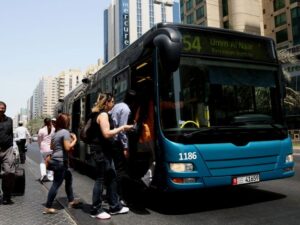
Public transportation is vital to modern urban life, especially in rapidly growing cities like Abu Dhabi. As the capital of the United Arab Emirates, Abu Dhabi has made significant strides in developing an efficient, reliable, and sustainable public transport system. Whether you are a resident or a visitor, understanding the city’s transport options can greatly enhance your experience. This comprehensive guide covers everything you need to know about Abu Dhabi’s public transport, from buses to taxis and beyond.
Overview of Abu Dhabi’s Public Transport System
Abu Dhabi has a well-planned public transport network that aims to provide convenient and affordable travel options for everyone. The city’s transport authority, the Department of Municipalities and Transport (DMT), manages and regulates the various modes of transportation. The public transport system is designed to meet the needs of the city’s diverse population and to support its economic and social development.
Key Components of the Public Transport System
- Buses: The backbone of Abu Dhabi’s public transport, offering extensive coverage across the city and surrounding areas.
- Taxis: Widely available and convenient, taxis are a popular choice for quick and direct travel.
- Ferry Services: A unique way to travel, especially between the mainland and nearby islands.
- Car Rental Services: For those who prefer the flexibility of driving, car rental options are plentiful.
- Future Developments: Plans include the introduction of trams and metro systems to further enhance connectivity.
Buses in Abu Dhabi

Extensive Coverage and Routes
Abu Dhabi’s bus network is extensive, with routes covering the entire city and extending to suburban areas and neighboring emirates. The buses are modern, air-conditioned, and designed for comfort. The network operates around the clock, with specific routes running 24 hours a day, ensuring that you can reach your destination at any time.
Bus Stops and Terminals
Bus stops in Abu Dhabi are strategically located, with clear signage and seating facilities. Major bus terminals, such as the Abu Dhabi Central Bus Station, serve as hubs for various routes. These terminals are equipped with amenities like waiting areas, restrooms, and information desks.
Ticketing and Fares
Fares for bus travel in Abu Dhabi are affordable, making it an economical option for daily commuting. The Hafilat Card is the primary mode of payment for bus rides. This rechargeable smart card can be topped up at various locations, including bus stations, convenience stores, and online. Fares vary depending on the distance traveled, but they are generally very reasonable.
Accessibility and Special Services
Abu Dhabi’s buses are designed to be accessible to everyone, including those with disabilities. Most buses are equipped with ramps, priority seating, and space for wheelchairs. Additionally, there are special services available, such as the “Ladies Only” buses, which provide a comfortable and safe travel option for women.
Taxis in Abu Dhabi
Availability and Convenience
Taxis are a popular and convenient mode of transport in Abu Dhabi. They are available 24/7 and can be hailed on the street or booked through various apps. The taxis in Abu Dhabi are regulated by the TransAD, ensuring that they meet safety and service standards.
Types of Taxis
- Standard Taxis: These are the most common and can be found everywhere in the city. They are easily recognizable by their silver color with yellow roof lights.
- Airport Taxis: Available at Abu Dhabi International Airport, these taxis offer a direct and comfortable ride to your destination. They have higher fares compared to standard taxis.
- Ladies Taxis: Driven by female drivers, these taxis cater specifically to female passengers and families. They are identifiable by their pink roof lights.
- Special Needs Taxis: Equipped with facilities to assist passengers with mobility challenges, these taxis provide a crucial service for those in need.
Fare Structure
Taxi fares in Abu Dhabi are metered, with rates regulated by the government. The fare starts with a base rate and increases based on distance and time. Night rates are slightly higher. While cash payment is accepted, many taxis now offer the convenience of card payments, including contactless options.
Safety and Regulations
Taxis in Abu Dhabi adhere to strict safety and service standards. Drivers undergo rigorous training and background checks, ensuring a safe travel experience. All taxis are equipped with GPS, allowing for efficient navigation and quick response in case of emergencies. Passengers can also rate their taxi experience through the TransAD app, which helps maintain high service standards.
Ferry Services in Abu Dhabi
Unique and Scenic Travel Option
Abu Dhabi’s ferry services provide a unique and scenic way to travel between the mainland and surrounding islands. Operated by the Department of Municipalities and Transport, the ferries offer a comfortable and relaxed journey with stunning views of the coastline and city skyline.
Major Routes and Destinations
The primary ferry routes connect the city with nearby islands, such as Dalma Island and Sir Bani Yas Island. These routes are popular with both residents and tourists, offering a peaceful alternative to road travel. The ferries operate on a regular schedule, with increased frequency during peak times and weekends.
Ticketing and Fares
Tickets for ferry services can be purchased online or at the ferry terminals. The fares are reasonable and vary depending on the destination and type of service. Some ferries offer premium services with additional amenities like lounges and priority boarding.
Accessibility and Comfort
Ferries in Abu Dhabi are designed to be accessible to everyone, with ramps and assistance available for passengers with disabilities. The vessels are equipped with comfortable seating, air conditioning, and restrooms. Some ferries also offer onboard refreshments and entertainment options.
Car Rental Services in Abu Dhabi
Flexibility and Independence
For those who prefer the independence of driving, car rental services are widely available in Abu Dhabi. Renting a car gives you the flexibility to explore the city and its surroundings at your own pace. Numerous car rental companies, including both international and local options, provide a broad selection of vehicles. These choices cater to various needs and budgets, ensuring flexibility for all customers.
Rental Process and Requirements
Renting a car in Abu Dhabi is a straightforward process. You will need a valid driver’s license, passport, and a credit card. For residents, a UAE driving license is required, while tourists can use an international driving permit. Most car rental companies offer online booking, making it easy to reserve a vehicle in advance.
Insurance and Additional Services
When renting a car, it is essential to understand the insurance coverage offered. Basic insurance is often included in the rental price. For extra protection, additional coverage options are available. Many car rental companies also offer services like GPS navigation, child seats, and roadside assistance.
Driving in Abu Dhabi
Driving in Abu Dhabi is relatively easy, with well-maintained roads and clear signage. However, it is important to familiarize yourself with local traffic laws and regulations. Speed limits are strictly enforced, and there are heavy fines for violations. Parking is widely available, with both free and paid options, especially in busy areas.
Future Developments: Trams and Metro
Upcoming Projects
Abu Dhabi is continuously working on improving its public transport system. Future projects include the introduction of trams and a metro system, which will significantly enhance connectivity within the city. These projects are part of the government’s long-term vision to reduce traffic congestion, lower carbon emissions, and promote sustainable urban development.
Trams: A Sustainable Transport Option
The planned tram system will offer a convenient and environmentally friendly mode of transport. Trams are ideal for short-distance travel within the city, providing a seamless connection between key areas. The tram network will integrate with existing bus routes and future metro lines, creating a comprehensive public transport system.
Metro: Enhancing Connectivity
The metro system, once completed, will revolutionize public transport in Abu Dhabi. It will provide fast, reliable, and efficient travel across the city, reducing the reliance on private cars. The metro will be particularly beneficial for commuters, helping to ease traffic congestion during peak hours.
Tips for Using Public Transport in Abu Dhabi
Plan Your Journey
Before you travel, it is advisable to plan your journey using available resources. The DMT website and mobile app provide detailed information on routes, schedules, and fares. These tools can help you choose the best mode of transport and avoid delays.
Keep Your Hafilat Card Topped Up
If you are using buses, make sure your Hafilat Card is topped up with sufficient credit. You can check your balance and recharge your card online or at various locations across the city.
Use Ride-Hailing Apps
For taxis, ride-hailing apps like Uber and Careem are popular options. These apps allow you to book a taxi with just a few taps on your smartphone, providing convenience and peace of mind.
Be Aware of Peak Hours
Public transport often becomes crowded during peak hours, usually between 7:00 AM and 9:00 AM, and 5:00 PM and 7:00 PM. If possible, plan your travel outside these times to avoid the rush.
Respect Local Customs
While using public transport, it is important to respect local customs and traditions. Dress modestly, avoid public displays of affection, and be mindful of personal space.
Conclusion
Abu Dhabi’s public transport system is efficient and budget-friendly. It includes extensive bus routes, taxis, and scenic ferries. Upcoming tram and metro services will further enhance travel options. Whether you’re commuting, exploring, or traveling to nearby islands, Abu Dhabi’s public transport offers convenience and comfort. Learn how to navigate these services to fully enjoy the city’s vibrant atmosphere. For the best local advice on living in Abu Dhabi, contact Embayt Real Estate. Let us help you find the perfect property and make the most of your experience in this dynamic city.
FAQs
What are the main modes of public transport in Abu Dhabi?
Abu Dhabi offers a range of public transport options including buses, taxis, ferry services, and car rentals. Upcoming developments also include the introduction of trams and metro systems to enhance connectivity.
How extensive is the bus network in Abu Dhabi?
The bus network in Abu Dhabi is comprehensive, covering the entire city and extending to suburban areas and neighboring emirates. Buses operate around the clock, with some routes available 24/7, ensuring convenient travel at any time.
What is the Hafilat Card, and how does it work?
The Hafilat Card is a rechargeable smart card used for bus travel in Abu Dhabi. It can be topped up at various locations, including bus stations, convenience stores, and online. This card offers an economical and efficient way to pay for bus fares.
What types of taxis are available in Abu Dhabi?
Abu Dhabi features several types of taxis including standard taxis, airport taxis, ladies taxis with female drivers, and special needs taxis equipped for passengers with mobility challenges. Each type caters to different needs and preferences.
How can I pay for a taxi ride in Abu Dhabi?
Taxi fares in Abu Dhabi are metered, with rates regulated by the government. Payment options include cash and card payments, with many taxis now offering contactless card options for added convenience.
Are Abu Dhabi’s buses accessible to everyone?
Yes, Abu Dhabi’s buses are designed to be accessible, featuring ramps, priority seating, and space for wheelchairs. Special services like “Ladies Only” buses are also available to ensure comfortable and safe travel for women.
How can I ensure a safe taxi ride in Abu Dhabi?
Taxis in Abu Dhabi adhere to strict safety standards, with drivers undergoing rigorous training and background checks. All taxis are equipped with GPS for efficient navigation, and passengers can rate their ride through the TransAD app to help maintain high service quality.
